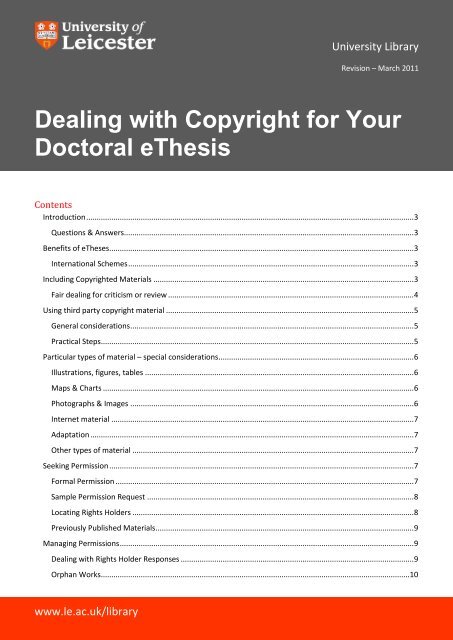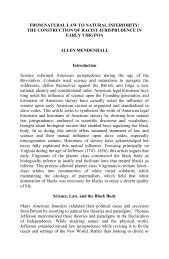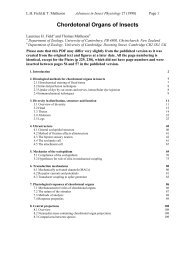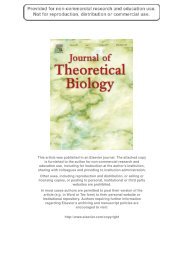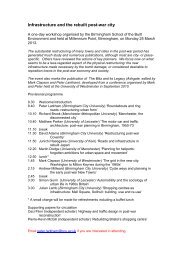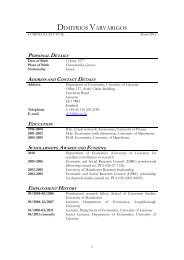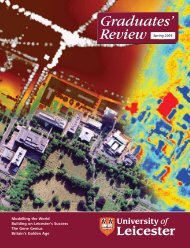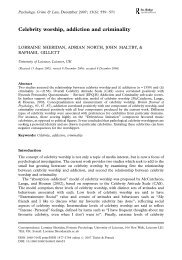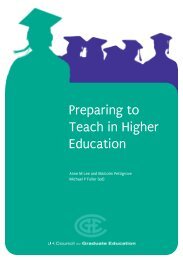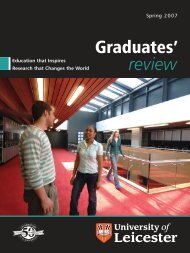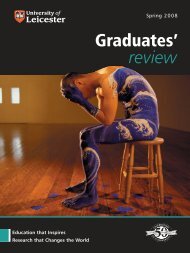Copyright and Your Thesis - University of Leicester
Copyright and Your Thesis - University of Leicester
Copyright and Your Thesis - University of Leicester
You also want an ePaper? Increase the reach of your titles
YUMPU automatically turns print PDFs into web optimized ePapers that Google loves.
2 UNIVERSITY OF LEICESTER · LIBRARY<strong>Copyright</strong> Transfer Agreements ....................................................................................................................... 10Unable to Contact Rights Holder ...................................................................................................................... 11Publishing from your <strong>Thesis</strong> ................................................................................................................................. 11Temporary Moratoriums .................................................................................................................................. 12Embargoes ........................................................................................................................................................ 12Choosing a Moratorium or an Embargo ........................................................................................................... 12Funding Bodies ................................................................................................................................................. 13Final thoughts ....................................................................................................................................................... 13Getting Help ...................................................................................................................................................... 14Glossary <strong>of</strong> Terms ................................................................................................................................................. 14References & Further Reading ............................................................................................................................. 15Appendix: Frequently Asked Questions & Answers ............................................................................................. 16TablesTable 1: What exactly is a rights holder? .................................................................................................................... 4Table 2: Have I used substantial third party items in my thesis? ............................................................................... 5Table 3: How would I check for copyright & permissions? ........................................................................................ 5Table 4: Using Images – rules <strong>of</strong> thumb ..................................................................................................................... 6Table 5: Seeking copyright permissions - protocol ..................................................................................................... 7Table 6: How would I lay out a permissions request? ................................................................................................ 8This work is licensed under a Creative Commons Attribution-NonCommercial-ShareAlike 3.0 Unported Licensewww.le.ac.uk/library
3 UNIVERSITY OF LEICESTER · LIBRARYThis work is licensed under a Creative Commons Attribution-NonCommercial-ShareAlike 3.0 Unported LicenseIntroductionThis h<strong>and</strong>out accompanies workshops led for the Student Learning Centre <strong>and</strong> for Staff Development, <strong>University</strong><strong>of</strong> <strong>Leicester</strong>. It gives you more information on the copyright implications <strong>of</strong> making your thesis available on theweb, as required by the <strong>University</strong>. While its focus is primarily on digital theses (etheses) rather than traditionalprinted versions, there is some coverage <strong>of</strong> the copyright law differences between the two different formats.Questions & AnswersIf you do have any questions, please do get in touch with the <strong>Copyright</strong> Administrator or LRA Team, butremember to see the Frequently Asked Questions at the end <strong>of</strong> this booklet first.Benefits <strong>of</strong> eTheses<strong>University</strong> <strong>of</strong> <strong>Leicester</strong> PhD doctoral students are now required by institutional ordinances to provide a licenseddigital copy <strong>of</strong> their completed, accepted thesis into the <strong>Leicester</strong> Research Archive (LRA), in addition toproviding two bound paper copies to the Graduate School.What are the benefits <strong>of</strong> putting your thesis online? Theses are an untapped source <strong>of</strong> information, usuallyhidden away in library stacks, whereas digital theses are more easily found, <strong>and</strong> you may gain more readers <strong>and</strong>increased visibility as a researcher. Many UK universities have similar m<strong>and</strong>ates to <strong>Leicester</strong>, <strong>and</strong> etheses havebeen around for longer in the USA <strong>and</strong> Australasia. Once deposited into the LRA your thesis will also go intoEThOS, the UK’s national ethesis scheme.International SchemesThe UK is not alone in creating extensive online collections <strong>of</strong> electronic theses. The US <strong>and</strong> Australia inparticular have been doing this longer <strong>and</strong> on a much greater scale than the UK to date.• USA, Networked Digital Library <strong>of</strong> Theses <strong>and</strong> Dissertations• Australasia, Australasian Digital Theses ProgramThe need for UK based research to remain visible <strong>and</strong> accessible in a global market is just one more reason whythe <strong>University</strong> <strong>of</strong> <strong>Leicester</strong> has m<strong>and</strong>ated the licensing <strong>of</strong> an electronic facsimile <strong>of</strong> your thesis on the LRA.Including <strong>Copyright</strong>ed MaterialsIn your thesis you will want to include material by other authors <strong>and</strong>this material will be copyrighted. An author automatically hascopyright in anything they write or otherwise create, they do notneed to apply for it or mark their work with the © mark for it toapply. Ideas <strong>and</strong> facts are not copyrighted, although presentation <strong>of</strong>Third party copyrightThis relates to any material that is not yourown creation, or where you are no longer therights holder (e.g. a published article)ideas <strong>and</strong> facts may be. In addition to content copyright, the format or layout (typography) <strong>of</strong> an item may haverights associated with it. Images within a work, e.g. book illustrations, may also have copyright over <strong>and</strong> abovethat embodied by the book as a whole. Finally authors can assign parts <strong>of</strong> their copyright to someone else, forexample, a publisher. Therefore any individual or corporate entity that currently holds the rights to exploit <strong>and</strong>reuse an item is known as the rights holder.www.le.ac.uk/library
5 UNIVERSITY OF LEICESTER · LIBRARYUsing third party copyright materialGeneral considerationsUsing correctly referenced <strong>and</strong> attributed third party material in a printed thesis does not need permission –under the law, the printed thesis is examination material, <strong>and</strong> so permission is not required. However, byplacing the thesis online you are making the work available to the public, <strong>and</strong> so permission must be obtained.• Long extracts <strong>of</strong> text from works by otherpeople• Illustrations or images• Figures or tables• Maps & charts, even those you haveredrawn yourself• Material <strong>of</strong> your own that has beenpreviously publishedIf you have included any <strong>of</strong> these items in your thesis, then permission from the rights holder may be requiredif you cannot claim the criticism or review defence, or if its inclusion may harm the commercial interests <strong>of</strong>the rights holder.Table 2: Have I used substantial third party items in my thesis?Practical StepsCheck the copyright <strong>of</strong> the item in question to see what you are allowed to do with it. You may be allowed toreproduce the material in your ethesis without asking permission. Alternatively, the material may be licensedunder a Creative Commons licence, allowing non commercial re-use.For items on the web• There may be a copyright notice at the top orbottom <strong>of</strong> the main page.• If not, check for terms <strong>and</strong> conditions on thesite.For material from archives, galleries, museums orother similar locations• Check their terms <strong>and</strong> conditions <strong>of</strong> access.• These may be on your entry ticket otherwisecontact the relevant organisation.For items from a book or journal• Check the publisher’s site for theirpermissions department.• Sometimes this can be located under theContact Us information.• If the journal or book was accessedelectronically, you should check the licenceterms associated with gaining or purchasingaccess to the item.If you have included any <strong>of</strong> these items in your thesis, then permission from the rights holder may be requiredif you cannot claim the criticism or review defence, or if its inclusion may harm the commercial interests <strong>of</strong>the rights holder.Table 3: How would I check for copyright & permissions?If permission is required, you will need to ask the rights holder’s permission. This may be the author, or, morelikely, the publisher. Be specific about exactly what material you want to include <strong>and</strong> about what is going tohappen to your ethesis. Keep copies <strong>of</strong> all the letters or emails you send, <strong>and</strong> <strong>of</strong> all replies.www.le.ac.uk/library
6 UNIVERSITY OF LEICESTER · LIBRARYParticular types <strong>of</strong> material – special considerationsIf you need to ask permission to use any <strong>of</strong> the following types <strong>of</strong> material, proceed as above. Remember thatthroughout this booklet we are considering gaining permission to use materials within your ethesis. Ifsubsequent to your doctorate you wish to publish an article or a book using material from your thesis, then youwould need to seek permission again from any third party rights holders; unless you specifically state in youroriginal request that you will also be seeking to publish using the materials as well. It is not unknown in theseeventualities for a rights holder to request or expect a fee to be paid.Illustrations, figures, tablesIf you have used an illustration purely as decoration, then this would certainly need to have express permissionas it falls outside the bounds <strong>of</strong> fair use. However, if you have used an image or figure as part <strong>of</strong> your argument,then this may count as criticism, <strong>and</strong> you may not need permission if it is a single instance. But if you are in anydoubt, ask permission. If you have reused multiple figures from the same source then this may well beconsidered as harming the commercial interests <strong>of</strong> the rights holder, in which case you would almost certainlyneed to obtain permission.Maps & ChartsIf you have used a map from organisations like the Ordnance Survey or Digimap, check the relevant licence tosee if the use is permitted. It should be noted that the OS is especially protective <strong>of</strong> its rights <strong>and</strong> that reuse <strong>of</strong>any <strong>of</strong> its maps without express permission is a high risk approach. If you have obtained the map from a book,check who owns the copyright in the map, this should be indicated either with the map, or at the beginning orend <strong>of</strong> the book. Some older maps or charts may be out <strong>of</strong> copyright (for instance, Ordnance Survey maps over50 years old are out <strong>of</strong> copyright), but never assume this is the case for all maps, <strong>and</strong> always fully acknowledgethe source <strong>of</strong> the material. It is better to take steps to gain permission, <strong>and</strong> then include as an orphan work thanto make no attempt to gain permission.Photographs & ImagesThese can be an especially tricky area <strong>of</strong> copyright, as even if you were the original photographer, you may betaking photographs <strong>of</strong> materials in which someone else holds rights. It is also important to remember that aphotograph on the Internet or a Website is likely to be copyrighted even if it doesn’t explicitly state this fact.However, the following general rules apply.• If someone else created the original image or photo, you need to seek permission from the photographer orrights holder• If you created the original image or photo, you are the rights holdero Unless you have assigned it to someone else oro You have photographed something that in which the rights are owned by someone else (e.g. a pages ina published book)• If the image is a photograph <strong>of</strong> peopleo You need their formal permission to use the photo in the digital thesis, unless they are incidental to thephoto (e.g. a picture <strong>of</strong> a building with people passing by)o If the people are deceased, it is unlikely you will need to ask anyone else for permission, but please usecaution if the photographs are <strong>of</strong> a sensitive nature or used in a manner which could cause distress t<strong>of</strong>riends <strong>and</strong> relatives.o If the photograph is <strong>of</strong> minors or <strong>of</strong> an otherwise sensitive nature you may need to discuss the ethics <strong>of</strong>its inclusion as well as seeking permission.Table 4: Using Images – rules <strong>of</strong> thumbAs this is not a straightforward area, if you are considering using a significant number <strong>of</strong> pictures in which thereare third party copyright considerations then it is advisable to contact the <strong>Copyright</strong> Administrator for advice atthe earliest possible juncture.www.le.ac.uk/library
8 UNIVERSITY OF LEICESTER · LIBRARYWritten permission does not need to be in print, a dated email is likely to be sufficiently attributable for yourpurposes. However, some rights holders do not posses readily locatable email addresses <strong>and</strong> in all eventualitiesyou will probably send a letter or two as well. Remember postal replies will take longer than email, <strong>and</strong> you willneed to factor this into your permissions seeking timescale.Sample Permission RequestThere is no absolute format that a permissions request must take, but a good practice example is shown below(Table 6).Dear [NAME],I am currently in the process <strong>of</strong> finalising my PhD thesis on ………………, which I amshortly due to submit to the <strong>University</strong> <strong>of</strong> <strong>Leicester</strong>.During my research, I came across the following article/image ……………. <strong>and</strong> wouldlike to request your permission to include it in an electronic copy <strong>of</strong> my thesis.The <strong>University</strong> <strong>of</strong> <strong>Leicester</strong> requires their students to submit an electronic copy totheir institutional repository, <strong>Leicester</strong> Research Archive (https://lra.le.ac.uk/), which isa digital archive <strong>of</strong> research outputs from the <strong>University</strong>. By submitting my thesis tothe LRA it will be available in full, to anyone, free <strong>of</strong> charge ("open access").I believe that the inclusion <strong>of</strong> …………… is integral to my thesis <strong>and</strong> would thereforebe extremely grateful if you could grant permission for me to use this ………….. in themanner detailed above. Naturally I would fully reference your work <strong>and</strong> include anyacknowledgement you deem appropriate.Please let me know if you require any further information, otherwise thank you inadvance for your kind consideration.Table 6: How would I lay out a permissions request?The key points that you should always highlight are:• The item for which you are seeking permission to reuse• Where you are seeking to reuse it (your thesis)• A short background to your need (the <strong>Leicester</strong> regulations, scholastic reasoning)As in all communication <strong>of</strong> this kind be specific, be polite <strong>and</strong> wherever possible be brief; a rights holder mayhave limited time to read extensive communications <strong>and</strong> in some cases may simply not feel they have the timeto respond to a longer request. You can always exp<strong>and</strong> on any requirements in subsequent correspondence.Locating Rights HoldersIn many cases the rights holders you will be approaching will be academic publishing houses; for whom thedetails will be easily locatable on the Internet. However, you may well wish to include materials for which youneed to seek out a specific individual or entity whom are not as easy to locate. While you may spend some timetracking them down yourself, or decide to treat materials as an orphan work (see below) there are agencies thatexist to aid in their location, such as WATCH <strong>and</strong> the Society <strong>of</strong> Authors websites.www.le.ac.uk/library
9 UNIVERSITY OF LEICESTER · LIBRARYPreviously Published MaterialsPublishing a portion <strong>of</strong> your thesis prior to its submission is a common<strong>and</strong> well established academic practice. However, you may need toconsider carefully your rights to re-use your own work within yourthesis at this point, if any rights have been gifted or otherwiseassigned to a publisher.Remember, you must clearly attribute anyportion <strong>of</strong> your work that has appearedelsewhere prior to your thesis submission,simply to avoid charges <strong>of</strong> self-plagiarism byyour examiners.If any portion <strong>of</strong> your thesis has been already published, perhaps as a journal article, you must check theagreement that you signed with the publisher. Even if you assigned copyright to the publisher, the agreementmay still allow you to use the material in your thesis so look for any educational exemption clause. If it does notexpressly note this or you are unable to find the agreement then you must approach the publisher forpermission directly.On the other h<strong>and</strong> you may wish to include a complete publishedIf you edit or remove any elements fromversion <strong>of</strong> an article written by you within the thesis. Normally whenyour thesis that appear in your print version,these articles are included they appear in the appendices <strong>of</strong> the thesisthen you need to let the LRA Administratorsprint version, but are commonly removed from the ethesis due to know, so they can highlight this in the onlinecopyright restrictions. Ideally you should seek permission from the record.publisher to include them, as they will contain significant elements <strong>of</strong>third party material such as your publisher’s type-setting, logo <strong>and</strong> br<strong>and</strong>ing.However, many publishers will be disinclined to grant permission for these full articles to be made availablewithin an institutional repository, <strong>and</strong> your time may be better spent elsewhere in your research. In this casejust remember to notify the library at the time <strong>of</strong> ethesis submission that there are elements <strong>of</strong> the thesis thatdo not appear in the electronic version, for reasons <strong>of</strong> copyright.Managing PermissionsDealing with Rights Holder ResponsesIf you are able to gain a response from the rights holder, there are a number <strong>of</strong> common outcomes:1) Yes, permission granteda. At the relevant place in the thesis, make sure you fully reference the item <strong>and</strong> acknowledge thatpermission has been granted. E.g. Picture reproduced with permission <strong>of</strong> Mr T.C. Smith.2) Yes, permission granted but with conditionsa. These will vary between different rights holders.b. They may require perhaps a link to the published material, or a more formally wordedacknowledgement in the text.c. They might even request that the ethesis not be made available immediately. You can request amoratorium (delay) when you submit your thesis to address this.3) Fee required for permissiona. Some rights holders will request a fee to include theiritem in your thesis.b. You <strong>and</strong> your supervisor will have to discuss ways inwhich this fee can be paid.c. If you decline to pay the fee, then permission is notgranted <strong>and</strong> you will have to proceed as below.Fees, <strong>and</strong> the amounts rights holders chargeare an uncertain science. While it is notuncommon to encounter one <strong>of</strong> the order£7-50, higher <strong>and</strong> lower fees are notunknown. In some rare cases rights holdershave been known to even ask the requestorwhat they consider an appropriate fee!www.le.ac.uk/library
10 UNIVERSITY OF LEICESTER · LIBRARY4) No, permission not granteda. If the copyright holder declines permission, then you could remove the material from yourethesis (see submitting an edited thesis below).b. The examination exception will let you keep the item in the print thesis.5) Uncleara. You may have been in touch with a rights holder, but at the point <strong>of</strong> thesis submission they maynot have granted nor declined permissions to include their items.b. If it looks likely that they may (eventually) grant permission, place a moratorium on your thesis.You can always request this to be lifted once the rights holder grants permission.c. Alternatively you can deposit an edited thesis (see below) with the item removed. If at a laterdate the rights holder gives permission, the LRA will happily update the version <strong>of</strong> your thesisavailable online.Ensure you keep copies <strong>of</strong> the correspondence between you <strong>and</strong> the rights holders for some years after yougraduate, you may need to refer to them again in the unlikely event <strong>of</strong> a challenge to your inclusion <strong>of</strong> thematerial.Orphan WorksOrphan works is the term used to describe works where the rights holder cannot either be ascertained, orcontacted. This can happen if the publisher has gone out <strong>of</strong> business (the FOB website may be <strong>of</strong> use), orrepeated attempts to contact them have failed. It may also be that the rights holder has predeceased yourrequest, <strong>and</strong> you have been unable to establish to whom the rights have passed; normally this is the next <strong>of</strong> kinbut they may have been willed or subsequently sold to a third party, further complicating the matter!In these instances, a judgment has to be made as to the level <strong>of</strong> risk associated with using the extract. As you willsee below, you can opt to remove the potentially risky item from your ethesis. However, it may be that theremoval will cause structural or scholarly problems with your research narrative. In this eventuality you maydecide to accept that the modicum <strong>of</strong> risk you are exposing yourself to is worthwhile when contrasted with thebenefit to retaining the integrity <strong>of</strong> your ethesis as a whole.If you need advice over seeking permission, or interpreting the responses <strong>of</strong> a rights holder, then remember tocontact the Library’s <strong>Copyright</strong> Administrator for further advice.<strong>Copyright</strong> Transfer AgreementsPublishers’ copyright transfer agreements (CTA) for journals canbe complex, lengthy, confusing or in some cases impossible toeven locate. If you have ever formally published a journal articleor a book chapter then you will probably have been asked to signone prior to publication. Upon signing one an author will likelyhave transferred the economic rights for reproduction <strong>and</strong> reuse<strong>of</strong> their work to the publisher; although their moral rights willhave been retained. While some more cunning authors mighthave made use <strong>of</strong> something like the SPARC Authors Addendum toretain their rights the vast majority <strong>of</strong> them will have compliedwith the publisher’s st<strong>and</strong>ard terms <strong>and</strong> conditions.Moral RightsThese are the right <strong>of</strong> the author to beidentified as the originator <strong>of</strong> a work, <strong>and</strong>cannot be transferred. It also includes theright for their work not to be subject toderogatory treatment.Economic RightsThese allow for the control <strong>of</strong> thereproduction <strong>and</strong> reuse <strong>of</strong> a piece <strong>of</strong> work.These can be sold, transferred or gifted toanother entitywww.le.ac.uk/library
11 UNIVERSITY OF LEICESTER · LIBRARYThus if you are reusing portions <strong>of</strong> journal articles in your thesis you will probably need to examine the CTAs forthe journals in question. Thankfully the SHERPA/RoMEO site allows you to search by publisher or journal, <strong>and</strong>provides links to publisher copyright transfer agreements, which can be much quicker than simply searchingGoogle. However, the majority <strong>of</strong> information on the SHERPA/RoMEO site itself is aimed at archiving papers inopen access repositories, rather than including items in thesis, so for the latter you will need to visit thepublisher’s sites directly.Remember if you do run into any difficulty in underst<strong>and</strong>ing what third rights a CTA does or doesn’t transfer to apublisher, then speak to the <strong>Copyright</strong> Administrator or LRA Administration team for more help.Unable to Contact Rights HolderIf you are unable to trace a rights holder or receive no response to repeated requests for permission, you havetwo options open to you.1) Submit an edited ethesis to the LRA (no risk)a. Remove any items/sections where you were unable to locate a right’s holders, or obtainpermission.b. You will need to notify the LRA that this is an incomplete copy <strong>of</strong> your work so they can add theinformation to your thesis record.c. <strong>Your</strong> unedited print thesis will be deposited in the library.d. If taking the third party material out renders the thesis unusable, then you will need to speak tothe LRA team about the possible options available. There is no legal risk associated with thisapproach.2) Submit with the items still included (potential risk)a. Where you have made a number <strong>of</strong> repeated <strong>and</strong> documented efforts to contact a rights holder,<strong>and</strong> have received no response, then you could choose to include the item.b. You must be able to show the lengths to which you went to contact a rights holder for someyears afterwards on request.There is some risk associated with this second approach. The rights holder may at some point object to itemsbeing used <strong>and</strong> ask for the LRA to take down the thesis <strong>and</strong> potentially threaten legal action. At this point youwill need to demonstrate that you used all due diligence in trying to obtain permission.The only 100% risk free approach to dealing with third party copyright items is to have clear permission grantedfor each one or to remove any items with uncertain permissions status from your ethesis.Publishing from your <strong>Thesis</strong>If you think you might want to publish part <strong>of</strong> your thesis in itscurrent form <strong>and</strong> you have a publisher in mind, you should check thepublisher’s policy. If you think that your chances <strong>of</strong> publication willbe harmed, or you have not yet identified a suitable publisher, seek amoratorium.Remember, you are still required to submitan electronic copy to the LRA Administrationteam; Even with a moratorium or anembargo!If you think you will be publishing it after significant revisions or changes, then this may not be an issue, but it isworth discussing it with your supervisor <strong>and</strong> the prospective publisher if possible.www.le.ac.uk/library
12 UNIVERSITY OF LEICESTER · LIBRARYTemporary MoratoriumsA moratorium is a delay in the thesis being loaned to another library or placed onto EThOS <strong>and</strong> the LRA, <strong>of</strong> up tothree years from the date <strong>of</strong> your degree award. <strong>Your</strong> thesis will still be available for consultation within theDavid Wilson Library.When you submit your thesis to the Graduate School, you may request a delay at this point. Once this delay hasexpired, then your thesis will be made available online. Common reasons for placing a moratorium are to allowjournal articles to be published or to comply with rights holder or funder requests before your thesis is sharedwith the world. However, you are still required to submit an electronic copy <strong>of</strong> your thesis to the LRAAdministration team at the same time as your printed version.If you are unsure as to the length <strong>of</strong> time that you should request for a moratorium, it is advisable that youdiscuss this with your doctoral supervisor as they will have an insight into the time from the point <strong>of</strong> a scholarlywork submission to its eventual appearance as a publication in your discipline.EmbargoesAn embargo can be a temporary or more permanent restriction <strong>of</strong> your printed <strong>and</strong> e<strong>Thesis</strong>. During the embargoperiod it will not be made available on the LRA <strong>and</strong> EThOS, a catalogue record will not be created, nor willanyone be allowed to read the printed version. If you think you will need to place an embargo you <strong>and</strong> yoursupervisor must apply to the Graduate School <strong>and</strong> Senate some 3 months before you submit your thesis.Senate <strong>and</strong> the Graduate School will normally only grant an embargo for a 3 year period initially. Shortly beforethe expiration <strong>of</strong> this period cases are reviewed <strong>and</strong> a decision is made as to its continuance for another 3 years.You may be consulted by the <strong>University</strong> at this point in time. In rare <strong>and</strong> exceptional circumstances a permanentembargo can be granted which will not normally be reviewed or redacted.You must still submit an electronic copy <strong>of</strong> your thesis at the same time as your printed version even if you havebeen granted an embargo, although this will be placed in a dark-archive. At the point <strong>of</strong> which the <strong>University</strong>deems an embargo to have expired, then your ethesis will be made live on the LRA <strong>and</strong> EThOS.Choosing a Moratorium or an EmbargoTo gain the maximum career benefits from your ethesis you will want to make it available as soon as possible.However, as noted above, in order to assuage some publishers’ concerns over prior availability <strong>of</strong> original work 2on the web you may wish to delay availability. How long that period should be is best a question discusseddirectly with your supervisor.While a thesis with a moratorium can be consulted in the David Wilson Library in person in print, it won’t besupplied in print or as a photocopy to other universities; retarding the spread <strong>of</strong> your research <strong>and</strong> pr<strong>of</strong>essionalrecognition. It will be listed on the library catalogue so you will be able to direct potential employers there forgeneral information, although the entries are kept very simple in detail. The shorter the period <strong>of</strong> a moratoriumthat you decide on, the more quickly the open access career advantages will benefit you.Conversely an embargoed thesis will not be listed on the library catalogue, nor made available at any timeduring the period <strong>of</strong> embargo to even visitors to the library. To all intents <strong>and</strong> purposes there will be nothing todirect employers or collaborators towards if they wish to know more about your doctoral research, unless you2 Interestingly, you might like to think about the impacts <strong>of</strong> discussing your work through social networking sites (e.g. blogs)<strong>and</strong> how a publisher might view those as well.www.le.ac.uk/library
13 UNIVERSITY OF LEICESTER · LIBRARYhave published from it. However, if for ethical, commercial or national security reasons you need to restrictaccess to your thesis then this is a decision you will have to take.Remember, if it is only an issue with elements <strong>of</strong> your thesis (e.g. a table <strong>of</strong> data or extract from a book) thenyou could always choose to edit this from the ethesis; while leaving it in the print version. This would allow youto gain the benefits without exposing yourself to any form <strong>of</strong> legal risk.Funding BodiesIf you are externally funded, check the conditions <strong>of</strong> the grant. For example, the grant making body may own theresearch you produce, or apply certain conditions to its reuse. If those appear to clash with the <strong>University</strong>m<strong>and</strong>ate, seek advice from your funding body. The funder may agree to allow re-use <strong>of</strong> the material subject to atemporary moratorium period. Some funders may however, insist on commercial secrecy <strong>of</strong> their funded work<strong>and</strong> may require that you seek an embargo. In this case it is best to discuss this matter with your supervisor <strong>and</strong>the Graduate School as soon as possible.Final thoughts• If you are in doubt about an item’s copyright <strong>and</strong> reuse status, ask permission from the rights holder.• Don’t leave seeking permission until the last minute, it can take weeks.• Remember if permission is still outst<strong>and</strong>ing on the day that you submit your print <strong>and</strong> electronic theses,you can place a moratorium on the ethesis. You can always request its removal once permission isgranted.• Keep copies <strong>of</strong> all correspondence, for at least 5 years after you graduate. You may need to refer tothem again.• Reference <strong>and</strong> acknowledge everything, even if you have not had to ask permission. This is goodacademic practice.• Ask for help if you need it: the Library is here to help.www.le.ac.uk/library
14 UNIVERSITY OF LEICESTER · LIBRARYGetting HelpRemember, you are not alone. There are lot <strong>of</strong> people around the <strong>University</strong> who will be able to support youwith this process.LRA Etheses Admin teamCan help with matters relating to the m<strong>and</strong>ate, copyright policies <strong>of</strong> publishers or journals, submitting digitally,<strong>and</strong> any possible clashes with grant making bodies. They are also happy to discuss practical issues relating tomoratoriums <strong>and</strong> embargoes.Email: ethesis@le.ac.uk or lra@le.ac.uk Telephone: +44(0)116 252 2039Tania Rowlett, <strong>Copyright</strong> AdministratorCan advise on matters relating to copyright, including methods <strong>of</strong> seeking permission.Email: copyright@le.ac.uk Telephone: +44(0)116 252 2039<strong>Your</strong> SupervisorCan help by advising on how publication timescales relate to moratoriums. They can also advise about setting upembargoes <strong>and</strong> assist you in discussions with rights holders.Graduate SchoolCan advise on the appropriate method <strong>of</strong> obtaining an embargo <strong>and</strong> the <strong>University</strong> regulations relating to PhD’s.Email: graduatedean@le.ac.uk Telephone: +44(0)116 229 7463IT Help DeskCan advise on creating PDFs from Word <strong>and</strong> other word processing packages.Email: ithelp@le.ac.uk Telephone: +44(0)116 242 2253Hopefully now you have a better idea about how to seek permission for items in your thesis where other peoplehave rights. If you’re not sure or would like more details about anything please ask.Glossary <strong>of</strong> Terms• <strong>Copyright</strong> – (simply) is legal protection for an author/ creator which restricts the copying <strong>and</strong> reuse <strong>of</strong> anoriginal work they have created. Often shortened to simply rights• <strong>Copyright</strong> transfer agreement (CTA) – legal form commonly signed by authors transferring reproduction<strong>and</strong> reuse rights in a work to a publisher for the purposes <strong>of</strong> publication• Creative Commons – an alternative to absolute copyright, that permits certain categories <strong>of</strong> reusechosen by the rights holder• Embargo – a permanent or semi-permanent restriction in an electronic <strong>and</strong> printed thesis’ availability;only grantable upon application to Senate <strong>and</strong> the Graduate Dean• e<strong>Thesis</strong> – electronic digital facsimile <strong>of</strong> the print doctoral thesis• Fair dealing, criticism <strong>and</strong> review – a poorly defined right to reuse substantial portions <strong>of</strong> a workwithout seeking formal permission• Formal permission – written or emailed correspondence with a rights holder granting permission toreuse/include a work in your thesis• The <strong>Leicester</strong> Research Archive (LRA) – the <strong>University</strong>’s online open access institutional repository.• M<strong>and</strong>ate – a Senate & VC approved university requirement with respect to deposition <strong>of</strong> research in theinstitutional repository (LRA)• Moratorium – an author requested temporary delay to the inter-library loan availability or photocopying<strong>of</strong> a print thesis <strong>and</strong> a delay in an ethesis being made available online• Rights holder – an individual or corporate entity who owns the rights for reuse <strong>of</strong> any materials.• Third party copyright – material in which others hold rightswww.le.ac.uk/library
16 UNIVERSITY OF LEICESTER · LIBRARYAppendix: Frequently Asked Questions & AnswersIf I redraw a map from an original, do I needpermission <strong>of</strong> the copyright holder <strong>of</strong> the original toinclude my map?If there is an object in my photo, (e.g. a Coke can) do Ineed permission <strong>of</strong> the copyright holder <strong>of</strong> the object?If I can’t find the copyright holder, can I leave the 3 rdparty material in?Does the university view my thesis as a “published”work – that is, can I list it as such on my cv?Can a permanent embargo be lifted by me?I want to place a copy <strong>of</strong> my thesis in the local record<strong>of</strong>fice. Is this a problem?Does copyright last for 70 years after death <strong>of</strong> authoreven if someone else is the copyright holder?Can we take no reply to our request as a “yes” – ormake statement to that effect in letter (that is, “if I donot hear from you within one month, I will assumeyou are granting permission”)?What if the publisher has ceased to exist?If an ethesis is a “published work”, who is thepublisher? The individual, or the <strong>University</strong>?Can the <strong>University</strong> m<strong>and</strong>ate a student to submit adigital copy <strong>of</strong> their thesis if it was not in their originalterms <strong>and</strong> conditions?Yes, unless your map is substantially different from theoriginal <strong>and</strong> has involved a degree <strong>of</strong> skills <strong>and</strong> judgementin its creation.Probably not, as long as it’s inclusion is either incidental(ie. not the primary reason for the photo) or, in terms <strong>of</strong>the print copy <strong>of</strong> your thesis only, is for the purpose <strong>of</strong>criticism <strong>and</strong> review.The use <strong>of</strong> orphan works, as such materials are known,comes down to a judgement <strong>of</strong> risk.If the material is old, it is probably ok to leave in butalways say where you found it. If you found it on theweb, take care before using – it ought to be possible totrace a copyright holder by checking their terms <strong>and</strong>conditions <strong>of</strong> use.You could list it as published but would need to list thedigital version.Yes – you would need to contact the Graduate School inthe first instance.You would need third party copyright permission as forthe digital copy.YesAgain, this is a judgment <strong>of</strong> risk, but our advice is not toinclude any work for which you do not have permissionto use.If it really has vanished, then there is nothing you can doto ask permission. Just keep records <strong>of</strong> where <strong>and</strong> howyou looked for info. However, it is possible that thepublication rights may have been sold onto anotherpublisher. It is worth checking the Firms out <strong>of</strong> Businesswebsite (http://tyler.hrc.utexas.edu/fob.cfm).Effectively the individual because the <strong>University</strong> does notrequire a transfer <strong>of</strong> rights <strong>and</strong> would not claimpublication.Only students submitting from 2008 onwards arem<strong>and</strong>ated.www.le.ac.uk/library
18 UNIVERSITY OF LEICESTER · LIBRARYDo most people put a moratorium on their thesis?What format should permissions be in?If you didn't come to this presentation how would youknow all <strong>of</strong> this information?How do I get access to theses to view style/how theyare set out etc?Will the <strong>University</strong> take legal action on my behalf?How long is a ‘substantial’ or ‘fair’ piece <strong>of</strong> text?Is only work with a © on it copyrighted?Between 20 <strong>and</strong> 30% at the moment [Nov 09] but seems tobe getting more popular. Being on the LRA is notformal/technically being publishing but if you wanted to beon the safe side <strong>and</strong> the difference between using researchor parts <strong>of</strong> your thesis for an article against using a wholechapter or the whole thing.Written form, either by letter, e-mail or fax. Verbalpermission is unlikely to be sufficient.It is available on the Graduate School website, Librarywebsite <strong>and</strong> LRA website.<strong>Your</strong> supervisor can help, but look at those on the LRA <strong>and</strong>ETHOS for examples.The LRA deposit licence specifically states that the‘<strong>University</strong> <strong>of</strong> <strong>Leicester</strong> is not <strong>and</strong> will not be under anyobligation to take legal action on behalf <strong>of</strong> me or otherrights holders if there is an infringement <strong>of</strong> intellectualproperty rights or any other right in the Work’.The law makes no definition <strong>of</strong> substantial but it isimportant to remember that it relates to quantity <strong>and</strong>quality.No. Although in the USA you are required to register yourcopyright <strong>and</strong> use this symbol, it is not a requirement inother countries. You always need to check the items terms<strong>and</strong> conditions <strong>of</strong> use/copyright information.www.le.ac.uk/library


